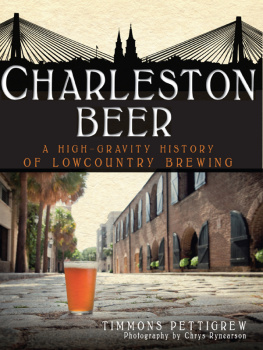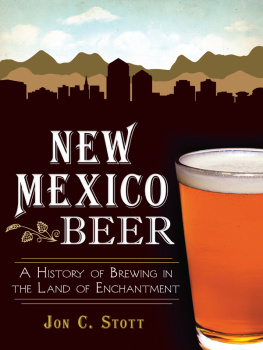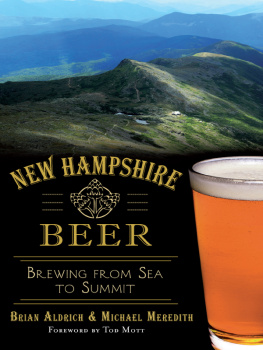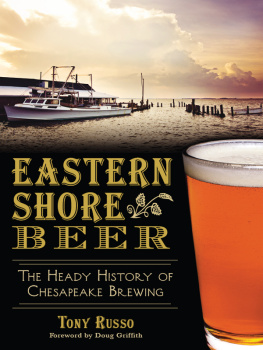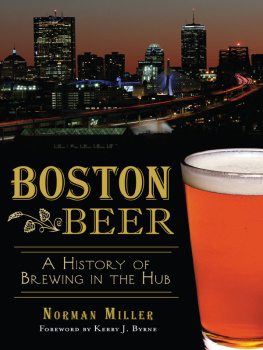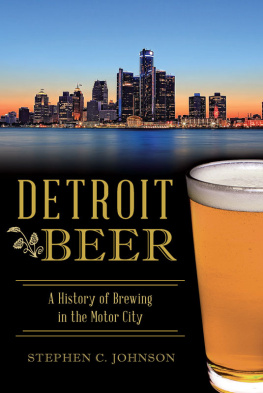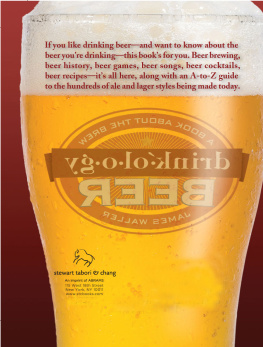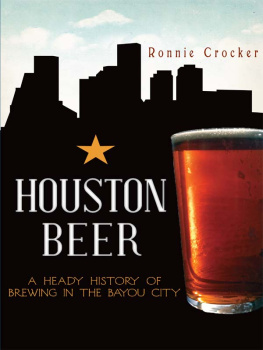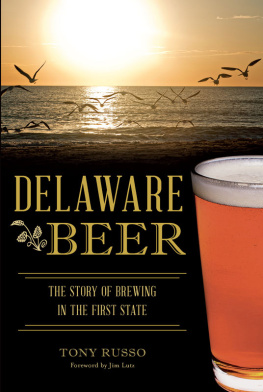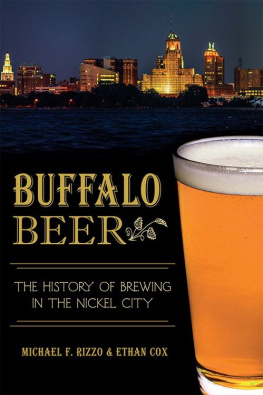

Published by The History Press
Charleston, SC 29403
www.historypress.net
Copyright 2011 by Timmons Pettigrew
All rights reserved
Cover design by Karleigh Hambrick.
Cover images by Chrys Rynearson.
First published 2011
e-book edition 2012
ISBN 978.1.61423.346.6
Library of Congress Cataloging-in-Publication Data
Pettigrew, Timmons.
Charleston beer : a high-gravity history of lowcountry brewing / Timmons Pettigrew.
p. cm.
Includes bibliographical references and index.
print edition ISBN 978-1-60949-244-1
1. Breweries--South Carolina--History. 2. Beer--South Carolina--History. I. Title.
TP573.U6 P48 2011
663.4209757--dc23
2011033110
Notice: The information in this book is true and complete to the best of our knowledge. It is offered without guarantee on the part of the author or The History Press. The author and The History Press disclaim all liability in connection with the use of this book.
All rights reserved. No part of this book may be reproduced or transmitted in any form whatsoever without prior written permission from the publisher except in the case of brief quotations embodied in critical articles and reviews.
Contents
Acknowledgements
Thanks to Ken Hawkins and TheDigitel Charleston for giving me a forum to write about beer and the encouragement to make me think I could do it.
Thanks to The History Press for reading my work there and taking a chance on me.
Thanks to the dedicated staff at the South Carolina Historical Society, the South Carolina Rooms at the Charleston County and Florence County Public Libraries, the Historic Charleston Foundation and Accessible Archives for preserving a wealth of information on our city.
Thanks to the good folks at the Charleston Beer Exchange, COAST Brewing, Frothy Beard Brewing, Holy City Brewing, Low Country Libations, Palmetto Brewing, Southend Brewery and Smokehouse, Westbrook Brewing and the one and only Jamie Westendorff for being gracious with their time.
Thanks to everyone pushing the craft beer agenda in the Lowcountry, be they producers, purveyors or consumers.
Thanks to Ryan Chesley for bringing me into his circle of local beer geek friends and being generous with amazing bottles before he knew me very well at all. He really, really wanted to be in this book. Ryan, dreams do come true. Thats his pint glass on the cover.
Thanks to my family for their support. Thanks especially to my wife, Summer, who endured untold earfuls of anxiety over this project and always feigned interest as she watched her husband add history geek to his already sizeable list of geeky interests.
Introduction
Writing a book about beer history is harder than you think. Sure, it sounds glamorous and exciting. Beer is fun by definition, so writing a book about the history of it must be a jaunty little venture, right? And who could possibly pass up all the liquid research that must be conducted along the way?
Dont get me wrong, this has been a hugely fulfilling, enjoyable experience, and woe is definitely not me. Much was learned during the course of my (paper-based) research. The surprise in all this was not what I learned from the pages and manuscripts I read, but what I learned from the lack of pages and manuscripts. There is simply not a huge, rich history of local beer knowledge waiting out there at your fingertips, at least not of the magnitude I expected. The major players that started in the 1800s and are still dominant today assuredly have great record-keeping, but I was after a more localized, people-centric story. Beer is touted as the common denominator of American history, so why the dearth of information?
Research on the general debauchery that went on during our nations younger years yields almost solely stories about spirits. Research about taverns will lead you to learn about liquor. Research about Prohibition is full of lips that touch liquor quotes and tales of bathtub gin. So where is beers place in all of this?
The conclusion Ive drawn is that beers place was so ingrained, so much a part of the everyday life of American culture, that it was wholly unremarkable. Before we had sanitized water and indoor plumbing, citizens of all ages drank beer of some sort in order to get hydrated without getting sick from water-borne diseases. Brewing was part of the regular duties of a rural housewife. Thats not to say that this culture was born in America; it just made its way over the pond during colonization and naturally hung around.
The integration of beer into everyday life can be traced far before and beyond Merry Olde England, however. Its thought that beer, like other alcoholic beverages, was an accidental discovery by a brave soul imbibing some old fruit or soaked barley that had been fermented in the open air. A more tangible history began in Sumeria, where the first written language teaches us that beer was a ubiquitous beverage consumed by folks in all walks of life. Its uses ran the gamut from medicine to ritual.
Civilizations rose and fell over the coming centuries, and beer was spread throughout North Africa and Western Europe along with the culture of the conquerors. Wine eventually took a stronger hold in grape-growing regions, while beer found a more permanent home in areas rich in grain production. It was there, specifically in Northern Europe, where brewing started as a household task and moved later to also be the province of the clergy. Many excellent varieties are still produced in monasteries today, where liquid bread became a form of sustenance and a gift for weary travelers.
Our children learn that the pilgrims landed on Plymouth Rock, but they are less often taught that this was due to a detour resulting from the seafarers running out of beer. Later, after founding the first colony in Virginia, it took less than a year for the governor to send word back to England that they were in desperate need of brewers. He astutely noted that to plant a colony by water-drinkers is an error that will result in ill health.
So the records of war abound, literature about the nature of our government and what it should be are plentiful and even tales of whiskey-induced bacchanalia are easy to find, but beer remains a scantly referenced subject. Upon reflection, you cant blame our ancestors for not chronicling the exploits of beer culture like they would a war or even shipping records. Beer was about as interesting and novel to them as soda pop is to us today. It was a given.
Despite our centuries-long love affair, beer has been unwoven from the fabric of American life. The concept of temperance, rising from the urbanization of the 1800s, changed the game completely. Even after Prohibition was repealed, its stigma remained. Beer today is a treat for adults only, not intended to be an everyday, all-day affair as a matter of course. We have strayed so far from the European model of drinking, which itself has changed as well, that drinking culture is unrecognizable to what it was in olden times.
Because of this new paradigm, beer has become interesting again. Our ways have changed enough that our old ones have become fascinating. But beer has also become interesting due to the craft beer boom. Over the last thirty-odd years, small American brewers have become adventurous, and American beer drinkers have followed suit. Following the national legalization of home brewing in the late 1970s, the practice of making interesting, flavorful, complex beer at home turned into an entrepreneurial exercise for many. Through the inspiration of pioneers on the West Coast like New Albion, Sierra Nevada and Anchor Steam, we now have well over one thousand breweries in the United States.
Next page
